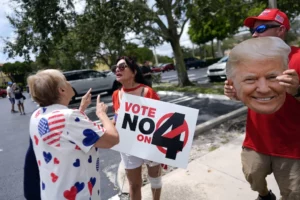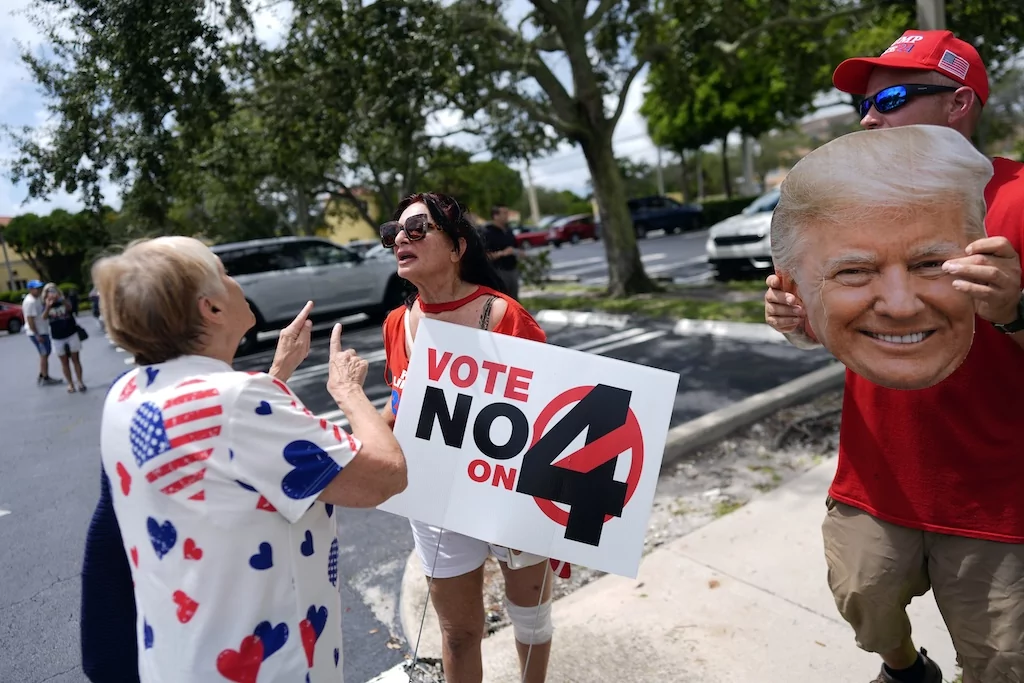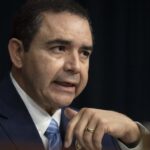
Voters across the country will weigh in on various ballot measures alongside the battle for the White House in the November election, but both presidential candidates will also face some awkward choices with the amendments on their home states’ ballots.
Vice President Kamala Harris, a California voter, and former President Donald Trump, a Florida voter, will face some of the highest-profile ballot measures, which have been sore spots for their respective political parties.
In California, voters will decide on Proposition 36, which would allow felony charges for certain drug possessions and thefts under $950 in value for offenders who have two prior similar convictions. The proposition would also be a partial repeal of 2014’s Proposition 47, in that it would increase prison sentences for other drug and theft charges.

When Proposition 47 was on the ballot 10 years ago, then-California Attorney General Harris did not take a stance on the ballot measure, and her campaign has not stated how she will vote on this year’s propositions, according to the Washington Post.
The measure is expected to pass, with a recent UC Berkeley Institute of Governmental Studies poll co-sponsored by the Los Angeles Times showing that 60% of likely voters support Proposition 36, compared to only 21% who oppose it and 19% who are undecided. The ballot measure shows bipartisan support, with a majority of Republicans and unaffiliated voters, along with a plurality of Democrats, backing it in the survey.
Democrats in the state are divided on Proposition 36, with Gov. Gavin Newsom (D-CA) and other state Democratic leaders having attempted to mount a rival ballot measure, which was unsuccessful. The measure has been supported by various Democrats, including San Francisco Mayor London Breed.
In Florida, Trump will vote on two measures on issues that have caused Republican problems in the past. Amendment 3 would legalize adults 21 and older to “possess, purchase, or use marijuana products” for recreation, while Amendment 4 aims to prevent the state from making laws that “prohibit, penalize, delay, or restrict abortion before viability or when necessary to protect the patient’s health, as determined by the patient’s healthcare provider.”
The Florida Republican Party has opposed both measures, but Trump has a split opinion.
Trump has said he will vote against Amendment 4, which he and opponents of the measure argue would prevent most, if not all, restrictions on abortion if passed, but he has endorsed Amendment 3.
The former president’s opposition to Amendment 4 falls in line with the GOP but was a rare instance of him weighing in on specific abortion measures during the 2024 campaign, as he defers abortion law to the states. Harris’s campaign has attempted to make abortion one of the top campaign issues, whereas Trump has attempted to focus on crime and immigration.

With Amendment 3, Trump is breaking from the party and state leaders, such as Gov. Ron DeSantis (R-FL) and Sen. Rick Scott (R-FL), to support the measure.
“As I have previously stated, I believe it is time to end needless arrests and incarcerations of adults for small amounts of marijuana for personal use,” Trump posted on Truth Social last month. “We must also implement smart regulations, while providing access for adults, to safe, tested product. As a Floridian, I will be voting YES on Amendment 3 this November.”
Both measures have dipped below the 60% threshold required to pass in recent polls. A Public Policy Polling survey from last month found that both measures only received 58% support, while a Victory Insights poll conducted last month found that Amendment 3 only had 54.1% support and Amendment 4 only had 49.7% support.
CLICK HERE TO READ MORE FROM THE WASHINGTON EXAMINER
In both of their respective home states, Trump and Harris are leading on their own turf.
In the RealClearPolitics polling average, Trump leads Harris 49%-43% in Florida, and Harris leads Trump 59%-35.3% in California. The Cook Political Report has rated California as “solid Democrat” and Florida as “likely Republican.”







